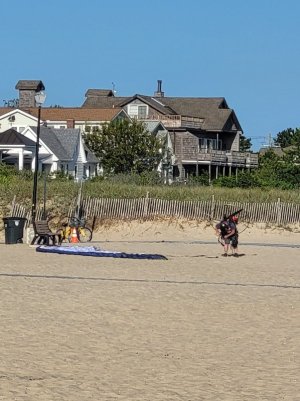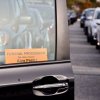Lewes Beach flight leads to proposed aircraft ban
As the Lewes beach commissioner, Kay Carnahan spends a lot of time with her eyes on the sand in the summer.
But she had her eyes on the sky over Savannah Beach Aug. 10.
Carnahan said a man parked his truck in the parking lot, set up a paraglider and took off.
“The takeoff was annoying. The landing was terrifying,” Carnahan said. “He used my CoolCabana as a marker.”
A paraglider is defined as a form of ultralight where the pilot wears a backpack motor, which provides enough thrust to take off. It can be launched in still air, on level ground, by the pilot alone. There is a parachute attached that acts like a wing and allows the pilot to maneuver.
Carnahan said she knows the name of the pilot involved in the Aug. 10 incident, but would not make it public because no laws were broken.
She said he did the same thing on a crowded Johnnie Walker Beach in 2024.
Carnahan said she called Lewes Police, who said there was not law against flying off the beaches.
So, Carnahan, who is serving as interim parks & recreation commission chair, introduced an ordinance Oct. 20 that would ban all non-emergency aircraft from takeoffs and landings on Lewes beaches.
The proposed measure states: No person may take off in or launch or land any aircraft or light-than-air craft upon or along the beach strand between Roosevelt Inlet and the Cape May-Lewes Ferry.
The ban would not apply to law enforcement, military, medevac helicopters or mosquito-spraying aircraft.
Rehoboth Beach has a similar ordinance. Chapter 79-2 of city code states: No person shall land any airplane or lighter-than-air craft upon or along the beach strand between Henlopen Avenue and Penn Street.
The FAA has jurisdiction over airspace, not where aircraft can land and take off.
“If it’s in the air, the FAA decides where they can fly, but state and local governments can dictate who can land and take off, and where,” said Commissioner Mardie Thomspon, a former FAA attorney, at the Oct. 20 meeting.
John Chirtea, an ultralight pilot who lives at Eagle Crest Aerodrome, said he has never landed on a local beach and does not believe it is a big concern.
“It’s no problem if the pilot chooses to take off and land, but they need to do it where they are not endangering anyone. We don’t need a law to ban it,” Chirtea said.
Roy Beiffwenger, president of the United States Ultralight Association, said his organization hears from both sides of the issue, pilots who feel they have been wronged by municipalities and people who think planes have flown too close.
“It’s not unusual to have ordinances like that around the country. But, we need to pursue people who are breaking the rules, not pass more laws,” Beiffwenger said.
Beiffwenger said the USUA partners with the FAA to educate pilots on laws and safety.
The commission discussed adding drone restrictions to the proposed ordinance.
“I find them intrusive and loud, and when they’re flying over people, I don’t know what they’re doing,” Carnahan said.
Thompson said she will look into the law regarding drones, but believes municipalities can restrict where they can take off and land.
The commission did not take any action on the aircraft ordinance, but said it will revisit the measure at a future meeting.
Bill Shull has been covering Lewes for the Cape Gazette since 2023. He comes to the world of print journalism after 40 years in TV news. Bill has worked in his hometown of Philadelphia, as well as Atlanta and Washington, D.C. He came to Lewes in 2014 to help launch WRDE-TV. Bill served as WRDE’s news director for more than eight years, working in Lewes and Milton. He is a 1986 graduate of Penn State University. Bill is an avid aviation and wildlife photographer, and a big Penn State football, Eagles, Phillies and PGA Tour golf fan. Bill, his wife Jill and their rescue cat, Lucky, live in Rehoboth Beach.






















































